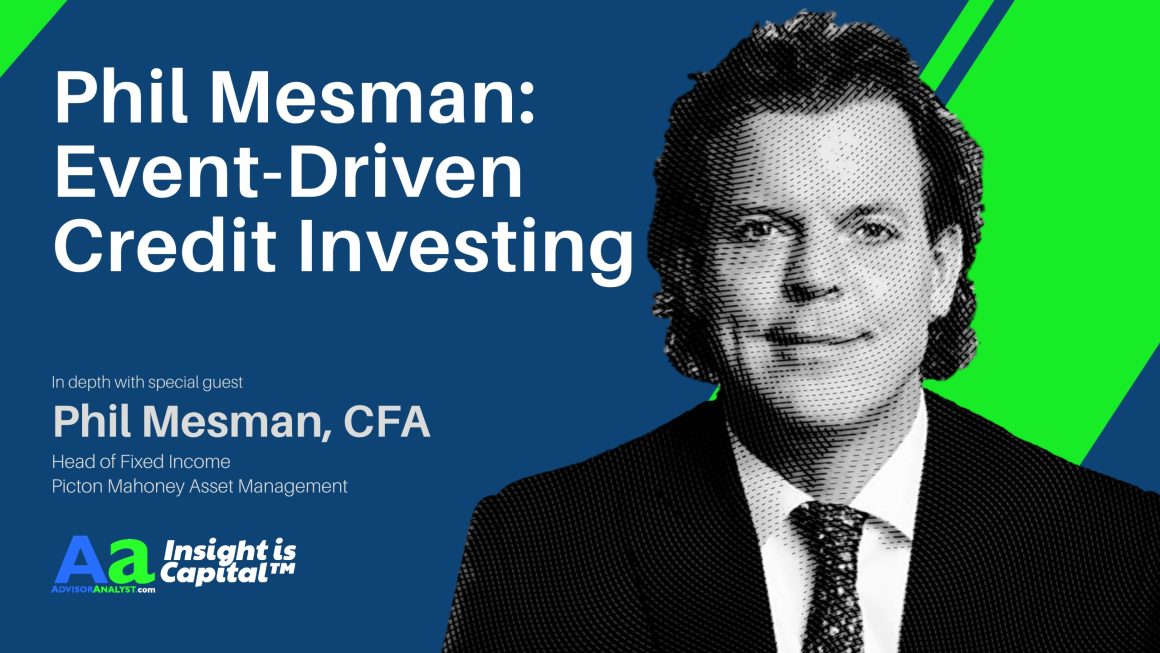Phil Mesman, lead fixed income portfolio manager at Picton Mahoney Asset Management sits down with Pierre Daillie to discuss credit investing, a widely underrepresented category of alternative fixed income in Canada.
They discuss the current challenges long-only bond investors face and why today’s environment has presented an unprecedented need to think alternative when it comes to your fixed income book. Mesman gets right under the hood of Special Situations credit investing and provides his thoughts on a real time event, the Evergrande situation.
Pierre Daillie: Hello and welcome to the Insight is Capital Podcast. I’m Pierre Daillie, Managing Editor at AdvisorAnalyst.com. I’m here today with Phil Mesman Partner and Head of Fixed Income at Picton Mahoney Asset Management.
We’re going to be discussing event-driven investing, or special situations in celebration of the firm’s latest liquid alternative fund launch Picton Mahoney Fortified Special Situations Alternative Fund.
Phil, Welcome to the show. It’s great to have you
Phil Mesman: Hey Pierre, thanks so much for having me today. Appreciate it.
Pierre Daillie: So, Phil tell our listeners about Picton Mahoney Asset Management, a little bit, and, and, the evolution of your alternative investment solutions and your role at the firm.
Phil Mesman: Sure, Picton Mahoney is an alternative investment manager. We were founded in 2004, employee owned and, at our firm, our mission is to help investors achieve their financial goals with greater certainty.
And key to that is, is building and identifying solutions that are different and that can add value to invest their portfolios. Or what we would like to say is fortify investor portfolios. And fortifying investor portfolios is really all about identifying return objectives and combining that with, risk constraints and putting that all together and, and to maximize total return and minimize risk.
And, we’re very excited that we’ve been managing those type of solutions in the equity space, income space, multi-asset space and merger arbitrage as well. I joined Picton Mahoney in 2009 to build out the income business. And the income business, our flagship strategy, which we launched at that time, our objective was to provide a corporate bond like return with less volatility than corporate bonds, and very pleased with our results over that 11 plus years and a really when you unpackage the strategy.
It’s a corporate bond focus strategy. So we look at corporate bonds and develop markets and we organize the portfolio a little bit differently than what you might see in traditional bond strategies. We have three segments and then we overlay hedging and those segments include what I call patient capital and that’s coupon, clipping and defensive corporate bonds.
It provides an anchor of a portfolio gives you that steady income. And then we combine that with special situation investing, which is what we’re going to talk about more today it’s event driven, credit investing. And then in addition to that, we have single name shorting, which is where you would short a corporate bond, because you think it’s expensive or you think that there might be some kind of challenge with the company.
And then we overlay those three segments with hedges and the hedging aims to protect the portfolio from interest rate, risk, currency, risk, credit volatility, liquidity risk. And those kind of things.
Pierre Daillie: Great. So, Phil, I mean, we know this is a tough environment for bond investors. Can you comment on what you’re seeing in the fixed income market right now? And follow up, I guess, where do we go from here?
Phil Mesman: Sure. Yeah, it is absolutely difficult for bond investing in general and the main crux at whatever it is that yields are very, very low globally across all us asset classes, within fixed income, government bonds, corporate bonds, et cetera. And so it’s difficult to get that income for investors.
And they’re used to getting, very consistent income g and in fact, great returns from fixed income for the last decade and kind of stepping back, and ask the question. Okay, well, what is income investing and what are you aiming to get? the objective from income investing is to get income and then also to get the protection of bonds to get that downside protection.
And when you look at the low yields we have today, it’s going to be very difficult for traditional bonds to deliver in this environment. And that’s creating a strong business case for alternative income investing. And, I would say that the, one of the strongest business case I’ve seen in my career for alternative income investing is today given these challenging income markets,
Pierre Daillie: Yeah. It’s, it’s, it’s really, it’s really created quite a conundrum. I mean, there’s so little room to move given, given how low yields are and given the, the sort of growing persistence of an inflationary outlook. And so Phil, as a bond person, If you were in an advisor’s shoes, what would you do with your fixed income?
Phil Mesman: Yeah, I’ll, I’ll address that first. I want to talk about that room to move in inflation. And, when I look at the risks today and the main risk in fixed income in my mind today is margin of safety or room to move. As you call the margin of safety. Is there enough yield cushion or, or credit spread a yield, let’s call it to handle volatility in that yield is so low.
It doesn’t matter where the volatility comes from inflation or from corporate spreads widening out. And, and so that, that is the challenge for sure. And on the inflationary front, I think reasonable minds can differ whether we will or won’t have inflation, but it doesn’t take much to hurt. in other words, yields don’t have to go up very much for you to feel volatility in your bond portfolio, given how low yields are today.
So with that, the question is, okay, what do you do about it? If I was, if I was in an advisor’s shoes, as a bond person, with all humility, if I was in an advisor’s shoes, what would I do? The first thing I think is critical is stepping back and just taking inventory of what you own in your bond book and looking how it all works together.
So I like the idea of bucketing everything between core and plus fixed income. So your core fixed income would include government bonds, investment grade, et cetera. And then your plus gets into high yield. And, and then perhaps emerging market bonds. So just kind of bucket those and then look for your overlaps.
And I really liked the idea of zero basing where, take a look at everything you own, but take a blank piece of paper. And if I were to say, okay, if I could give you a hundred dollars today, what would you buy in fixed income? And, with that, take that. And when you have that answer, go from where you are and work your way back to that.
And to me, finding a few strategies that do different things and work well together. Is really what you want to do. And I believe, key today is process. resiliency of process is critical. So spending a fair bit of time talking to the managers that you empower with your capital, do you understand their process and asking them, how are you going to make me money in this environment?
How are you going to protect the portfolio? Given our low yields are. And those kinds of questions I think are critical as part of the process.
Pierre Daillie: Okay. And you’ve also talked in the past about using or comparing the yield vs. the duration. Can you, can you talk about that a little bit and how useful that is
Phil Mesman: So yield divided by duration is I think one of the most important stats to look at for your fixed income. It’s how much money you’re going to make is your yield divided by duration, which is how much risk you’re taking.
And basically when you look at that stat, it’s at the worst risk reward in history for fixed income, worst-ish, I should say. So you have very low yield and very high duration. And so understanding that and understanding that risk is key and making sure you have a view on it.
Pierre Daillie: Thank you. It’s, bond is keep going
Phil Mesman: down, bond math. I love it. I
Pierre Daillie: think, I think, I think one of the things is that, investors feel that bond investing is a very mechanical, very arithmetic strategy when in fact, there’s a lot more fundamental homework that’s required. as in equity investing, as in traditional equity investing, particularly value investing has used a fundamental analysis to determine, the valuation of stocks. your approach also uses fundamental analysis to determine. the fair value for bonds and the fundamentals behind those bonds, the coverage, those sorts of concerns.
And that’s the kind of homework you’re doing behind the, behind the scenes. It’s not, it’s not strictly, it’s not, it’s not so much, any equation, which, which I think a lot of people think it might be, it’s a lot of, intuition and fundamental analysis and research, fundamental research that goes into Your decision-making.
Phil Mesman: Well, I think fixed income managers have over complicated, fixed income forever. It’s a big ruse to try to make it sound like mystique, Fabozzi who’s the Picasso of fixed income, if anyone has read any of his books or have had to read any of his books, I should say, we have several definitions of duration, several definitions of yield, but at the end of the day, it isn’t that complicated on, on the math side, there’s only a few variables that matter, but fundamentals are key, critically key as, as you’re highlighting air, for sure. Especially today.
Pierre: So that, which brings me to, special situations. Let’s talk about special situations credit investing. What, what is what’s, how does that work? What’s involved in that?
Phil Mesman: So stepping back, special situations, credit investing, has been a key to big, I should say, in the market, globally, very, very little representation here in Canada, but it’s a big category within fixed income outside of Canada.
And when I look at my career, I started out working at Scotia bank in commercial credit. And I’d like to think that I bring a banker’s perspective to To the bond market. then I spent time at Merrill-Lynch working as an analyst in our special situation investments. So we, we would be, would have a proprietary investments at Merrill Lynch in Toronto, and I was the analyst on some of those names.
And then I went to a hedge fund in New York, Greywolf capital, and in fact, a Greywolf, their, their flagship strategy was special situations. So I spent a lot of my career working on it. And when I moved back to Canada and I, and I joined Picton Mahoney to build out our income business, I really I appreciated the combination of this, this concept of special situations with patient capital and putting that together makes for really a dynamic fixed income strategy in my mind. It, it really very simply put is event driven, credit investing. So some kind of event happens within the credit markets and it’s our job to jump on it, analyze it, get under it and figure out if there’s something to do for investors.
And it involves forensic analytics. So imagine actually reading financial statements, reading the covenants of the bonds and seeing if there’s an opportunity within those bonds. And I would say the best analogy I could provide that I think would be maybe a little more accessible for investors because they might be more familiar with it is merger arbitrage.
So a merger arbitrage on the equity side involves, one company buys another company. And then the merger arbitrage investor goes and looks at those companies to see if there’s an opportunity there to make, to make some money. Same kind of idea. So there’s on our side, in the event driven credit investing, let’s say a merger.
It’s a great example. Company ‘X’ buys company ‘Y’, we jump in analytically like a SWAT team on company ‘Y’ the acquired company have a look at their financials, have a look at the covenants, identify if there’s an opportunity within the bonds. And it’s very much about process. It’s all about jumping in having look, digging deep, formulating an investment thesis putting the investment on monitoring the investment and then, and then unwinding it at the outcome.
Pierre Daillie: Does this type of environment that we’re in make it difficult to find the investing opportunities in special situations or does it help?
Phil Mesman: I think there’s always something to do. The bond market is huge. And, and really it’s, it’s an evergreen type of strategy. It’s been a key part of our, of our overall fixed income strategies since our onset in 2009.
So it’s been through many different market regimes since then. And, I actually really like this market for event driven credit investing. In fact, I think event-driven credit investing represents one of the best risk reward opportunities and all capital markets today because because yields are so low, it’s actually encouraging companies to do stuff.
So it’s encouraging companies to buy other companies. So an investment grade company buying a smaller high yield company, for example, it also encourages refinancing debt, taking out big coupon debt and issuing new bonds with lower coupons and less covenants. And so we’re seeing a lot of action, a lot of activity on the event side.
We’ve tilted our portfolios, our broader portfolios away from patient capital and more into event driven and credit investing because we see
more opportunities on that side. And to me, the patient capital or the broad markets are expensive, but within the markets, there are some amazing opportunities.
And particularly on the event side.
Pierre Daillie: I want to ask you about some, if you can share some sort of prime examples of special situations, but before I do that, I want to ask you also, if you can, if you can sort of define patient capital.
Phil Mesman: Sure. So again, the patient capital formulates, I would say the anchor of our broader fixed income portfolios, and it really is just coupon, clipping, and corporate bonds.
It’s the intent, the intention is to get that steady income with low volatility and it provides that key income within the book for, for fixed income. it compliments event driven investing very well. So event driven, it also involves income, but more importantly, you’re looking for a capital gain in a higher total return from that investment.
Phil Mesman: So our flagship strategies are, are the combination of patient capital, special situations, shorting, and then, and then hedges.
And what we’ve done with, with our new launch of our liquid alternative special situations fund is we’ve isolated that special situation
segment and pulled it out as its own standalone strategy.
Pierre Daillie: So what are some prime examples of special situations or event driven that you can think of?
Phil Mesman: Sure. There are many it’s We have several subcategories and so an includes merger arbitrage. As a, as I talked about before, capitalized recapitalizations so a company, changing their capital structure, refinancing. it would also include things like, regulatory changes. So we’ve seen some regulatory changes, particularly in the banking sector, which has been a big, big, big contributor of, of, of ideas for the last 11 years ever since the financial crisis.
And, in addition to that, perhaps rating agency changes. So an upgrade trade, so an investment going from, or pardon me, a company going from high yield. To investment grade when that happens, the yield and the bond goes down. And when you here’s the bond math again, you’ll so when a company goes from high yield to investment grade, the yield on the bond goes down and when you’ll goes down, price goes up and you make money.
So you get a capital gain. So the upgrade trade is, is likely that the best example I could think of, conversely, on the short side, the downgrade trade is a source of, alpha opportunities. And, kind of going back to the, we didn’t talk a lot about the short side, but to me, to me, given these low yields, we’re actually seeing a lot of interesting short side opportunities and, see that as, as a potential alpha source going forward for investors.
Pierre Daillie: So speaking of special situations, there’s one special situation right now in, in China, that’s dominating the news and that’s the, the Evergrande debacle that’s unfolding. What are your thoughts on that?
Phil Mesman: Yeah, it’s , it’s, it’s, it’s a big, special situation that. That credit represents around 15% of the high yield market in China.
So that’s, that’s a big one. And the question is, and this is a really good example of our process. So it’s interesting to me that it’s, it’s so everyone’s so attentive to it today because this has been happening for quite a while. So those bonds of the company have been steadily going down for several months and it all went back to the original source.
The, the regulators, China, basically wanting to restrict the amount of leverage in a lot of companies. So they wanted to pull to, to have them reduce leverage in general and Evergrande They ran into trouble because they had too much leverage in the balance sheet. So now we have this situation where, okay, here’s an event and question is okay, what do you do about it?
So Evergrande. The first thing we do is we, we unpackage a business. So we’re not involved in the name, but we would unpackage it and understand its implications to the broader market. So what is the follow-through trade? So my whole thinking, and this is all about. Special situation investing is you can’t predict something to happen, but don’t miss it.
So something’s happened now. What’s the follow-through what, what sectors are gonna get impacted? So that’s the analysis that we did. So we spent time, looking at what sectors can get impacted and a lot of raw materials sectors get impacted. Obviously given the housing nature of the business. In addition, the financial sector, could get impacted.
Is getting impacted in China and, and could get impacted elsewhere. So that’s the type of, type of, trades we’ll put on then on the back of that. So we’ll look for short side opportunities within sectors that could get impacted negatively because of this news event. And then in addition to that, I think the broader markets have been somewhat complacent about the information and have been for a little while.
And I think complacency is part of that, that, that margin, lack of margin of safety risk and. In addition to the sector ideas, we would also look to the broader markets, for hedging purposes and for potentially macro alpha like purposes. So shorting, perhaps the high yield market, as well or the investment grade market.
Pierre Daillie: That’s. That’s great. so, Phil, where does feel, where does a special situation strategy fit into a portfolio? Is it, is it income or is it absolute return?
Phil Mesman: It’s it’s a bit of both. So our, our broader strategies, again, aimed to provide a corporate bond like return with less volatility. So when I talked to an advisor or to an allocator, we talk about it as being that corporate bond replacement category within their allocations.
This is a little bit different. This the objective of special situations is to provide equity like return with bond-like volatility. So looking for a little more return. And therefore, I believe that if from an allocators perspective, you should fund that purchase by reducing perhaps your high yield allocation and your equity allocation.
So taking a bit of both and applying it to that, to that category.
Pierre Daillie: Thank you, Phil. That, that, that actually really, clarifies it. I think that would be one of the sort of leading advisor questions, leading investor questions, in terms of, how to make special situations. We know exactly where it fits. so, Phil, where can we learn more about Picton Mahoney and more about special situations credit investing
Phil Mesman: You can go to our website and PictonMahoney.com. And if you’re a financial advisor, reach out to one of our sales reps here at the firm, I, you can also email us support@pictonmahoney.com.
Pierre Daillie: Awesome. Phil, thank you so much for your valuable time it’s beeen really, enlightening and, I know, I know, I know our audience will have a lot to take away from this discussion. Thank you so much.
Phil: Thanks Pierre, Appreciate it.
















